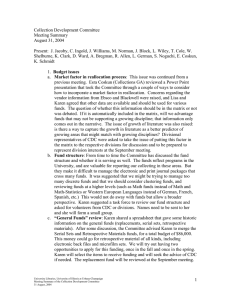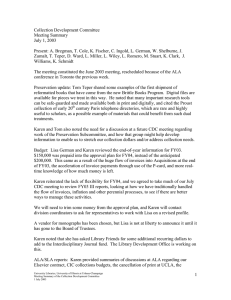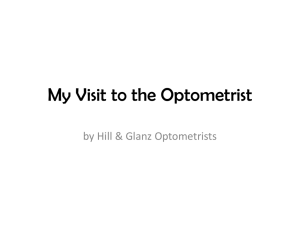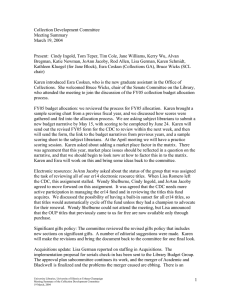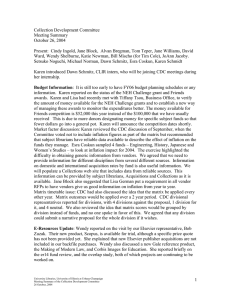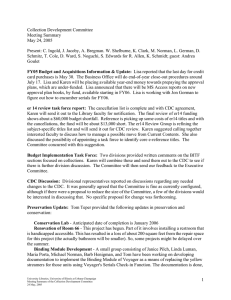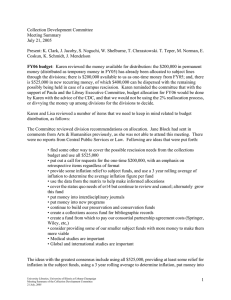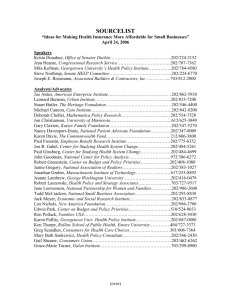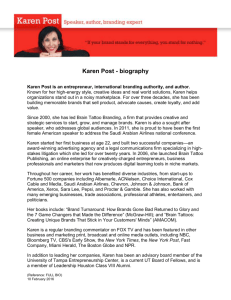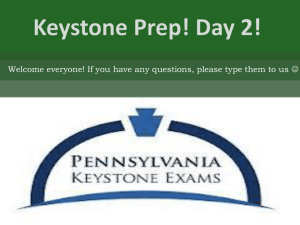Collection Development Committee Meeting Summary September 28, 2004
advertisement
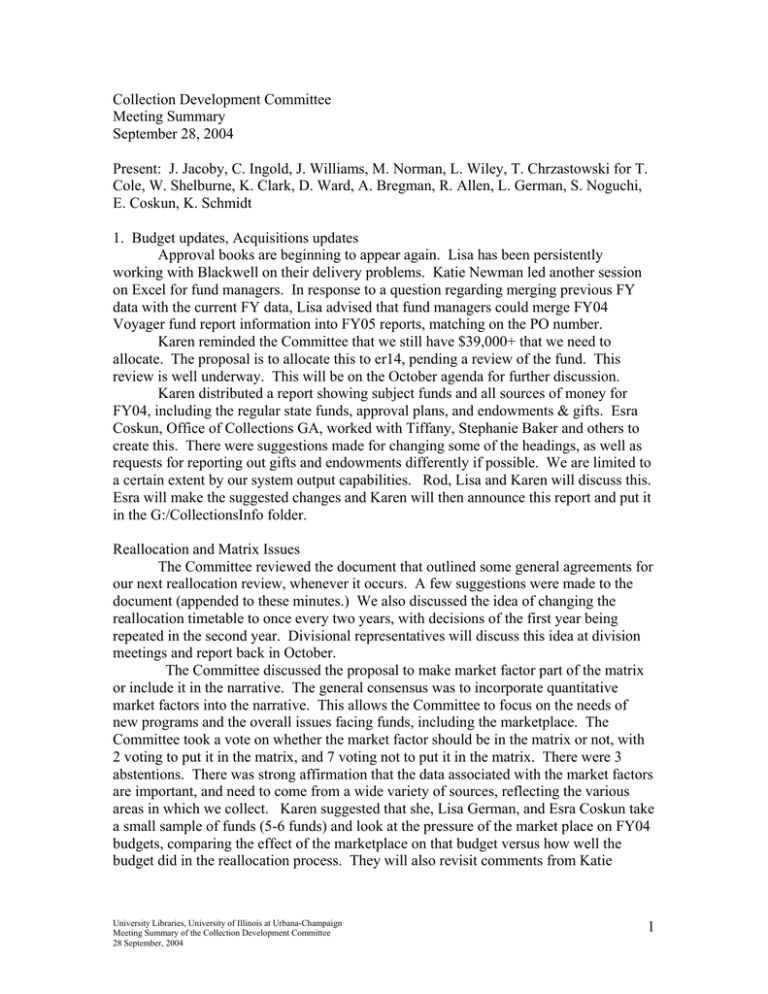
Collection Development Committee Meeting Summary September 28, 2004 Present: J. Jacoby, C. Ingold, J. Williams, M. Norman, L. Wiley, T. Chrzastowski for T. Cole, W. Shelburne, K. Clark, D. Ward, A. Bregman, R. Allen, L. German, S. Noguchi, E. Coskun, K. Schmidt 1. Budget updates, Acquisitions updates Approval books are beginning to appear again. Lisa has been persistently working with Blackwell on their delivery problems. Katie Newman led another session on Excel for fund managers. In response to a question regarding merging previous FY data with the current FY data, Lisa advised that fund managers could merge FY04 Voyager fund report information into FY05 reports, matching on the PO number. Karen reminded the Committee that we still have $39,000+ that we need to allocate. The proposal is to allocate this to er14, pending a review of the fund. This review is well underway. This will be on the October agenda for further discussion. Karen distributed a report showing subject funds and all sources of money for FY04, including the regular state funds, approval plans, and endowments & gifts. Esra Coskun, Office of Collections GA, worked with Tiffany, Stephanie Baker and others to create this. There were suggestions made for changing some of the headings, as well as requests for reporting out gifts and endowments differently if possible. We are limited to a certain extent by our system output capabilities. Rod, Lisa and Karen will discuss this. Esra will make the suggested changes and Karen will then announce this report and put it in the G:/CollectionsInfo folder. Reallocation and Matrix Issues The Committee reviewed the document that outlined some general agreements for our next reallocation review, whenever it occurs. A few suggestions were made to the document (appended to these minutes.) We also discussed the idea of changing the reallocation timetable to once every two years, with decisions of the first year being repeated in the second year. Divisional representatives will discuss this idea at division meetings and report back in October. The Committee discussed the proposal to make market factor part of the matrix or include it in the narrative. The general consensus was to incorporate quantitative market factors into the narrative. This allows the Committee to focus on the needs of new programs and the overall issues facing funds, including the marketplace. The Committee took a vote on whether the market factor should be in the matrix or not, with 2 voting to put it in the matrix, and 7 voting not to put it in the matrix. There were 3 abstentions. There was strong affirmation that the data associated with the market factors are important, and need to come from a wide variety of sources, reflecting the various areas in which we collect. Karen suggested that she, Lisa German, and Esra Coskun take a small sample of funds (5-6 funds) and look at the pressure of the market place on FY04 budgets, comparing the effect of the marketplace on that budget versus how well the budget did in the reallocation process. They will also revisit comments from Katie University Libraries, University of Illinois at Urbana-Champaign Meeting Summary of the Collection Development Committee 28 September, 2004 1 Newman and others about the market factor issue in the FY05 allocation process. The goal is to report on findings at the October meeting. Replacement Budget Karen shared a proposal for using our replacement budget to address brittle books, microfilming and associated reformatting in the Preservation Office, and building an acquisitions contingency fund to handle unexpected invoices that subject funds could not absorb. The Committee agreed with the proposed trial distribution, which will be reviewed after a year of experience. There is still a need to set aside some portion of this money for replacement of lost, damaged or missing books. Karen will work with Tom Teper, Lisa German and Lynn Wiley on this aspect of it. E-resource update, Report on review Wendy reported on a number of e-resource areas: the ISI representative is coming and Wendy will set aside a time for interested librarians to talk to him. We continue to have proxy problems with the Web of Science. CSA has a new platform affecting a significant number of our databases; more information on this will be forthcoming. Sage has changed its pricing model to begin charging for electronic access. Our Elsevier representative expects to visit October 21 and 22, with no specific schedule available at this time. Elsevier has purchased Urban and Fischer and these titles are now available on Science Direct. Our Cell Press titles are linked (except for Structure) and backfiles are operational. Our Elsevier Scopus trial is up and linked, and available through December 9, 2004. There is no pricing yet available, although the expectation is that it will be in the 6 figure category. Scopus is trying to establish itself as a competitive product to Web of Science. The er14/electronic resources review group met once since August, and Lisa Hinchliffe has joined the group to look at the ORR overlap. Esra Coskun will provide staff assistance to this group to enable its work. The ertech group now receives messages through OTRS – this allows the ertech participants to divvy up work and communicate more easily. There will be an e-book forum on October 29, 1:30-3:30, in Grainger Commons, sponsored by ERWG. More information will be forthcoming. Fund Structure Task Force Karen had asked for volunteers to serve on a task force to address the question of our current fund structure and whether it meets the needs of our present acquisitions practices. Jane Block, Allison Sutton, Sue Searing, Greg Youngen, Mumammad elFaruque, Lisa German and Karen Schmidt will comprise this task force, and report back to the Committee on findings and recommendations. Collections forum Karen suggested that we host a Library collections forum to engage in a discussion of the most pressing issues facing our collection development and management and suggesting ways to address these needs. She asked for volunteers to help her plan for this forum, with a probably target date on early 2005. University Libraries, University of Illinois at Urbana-Champaign Meeting Summary of the Collection Development Committee 28 September, 2004 2 Lisa and Karen also described an upcoming acquisitions forum that will address nuts and bolts issues of fund management and acquisition/cancellation. A date for this has not yet been set. Next meeting: October 26, 2:00-3:30. [gap in original text file – Uncertain what occurred to this text] at the September meeting. E-Resource fund review: Wendy Shelburne reported for the review group comprised of Wendy, Cindy Ingold and JoAnn Jacoby. They developed a detailed spreadsheet of the er14 fund and gave the CDC an overview of their work. The reports can be found at G:/CollectionsInfo/er14fundreport.xls. The review group will provide additional detailed information at the CDC September meeting. Lisa Hinchliffe will shortly be joining Cindy, JoAnn and Wendy to use the ORR overlap information to suggest possible cancellations of e-resources. These recommendations will come to the CDC for review. 3. Kluwer and Wiley CIC print archive: Karen reported that she had just learned that the CIC print archiving agreement for Kluwer and Wiley had been approved by the CIC directors. This is a 2 year pilot to model a way to manage the archiving of print during the transition from print to electronic, to assure CIC schools that a print copy will be in a dim archive. Subject librarians are free to cancel print subscriptions, details arte continuing to be worked out. ******* SUGGESTIONS FOR NEXT REALLOCATION REVIEW from CDC discussions (see item # 2 above) Talk about every fund and fund request received and underlying assumptions that led to scoring. Make explicit individual conventions used in scoring. Using the reallocation fund pool available to us, reviewers should provide dollar figures to funds, not scores; scores and dollar figures never add up and it is difficult to explain. Assign dollar amounts without reference to the matrix scores; consider narrative scoring before the matrix scores are even seen. These are two completely different exercises. Consider the issue of re-allocation which is not based upon the status quo. To that end we could consider giving bigger allocations to fewer funds. When inflation and market factors are used, cast widest possible net to gather market costs, foreign as well as domestic, type of publication (e.g. for Law, continuations are the largest factor in driving up cost) University Libraries, University of Illinois at Urbana-Champaign Meeting Summary of the Collection Development Committee 28 September, 2004 3 No substitutes should be sent to the re-allocation meetings; CDC members have been engaged in all of the discussions leading up to the reallocation process and have read all the requests. Reviewers who cannot be present may submit written justifications of their position which will be distributed to all members of CDC. Draft 9-28-2004 University Libraries, University of Illinois at Urbana-Champaign Meeting Summary of the Collection Development Committee 28 September, 2004 4
